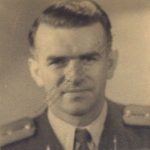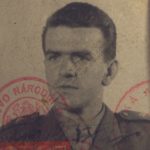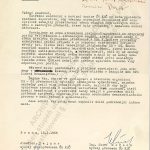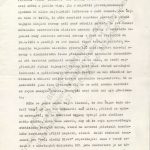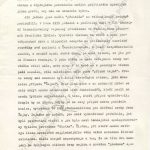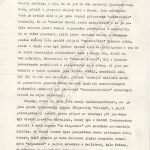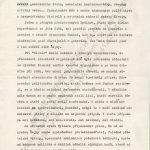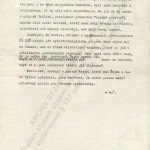Tišler Affair (1968)
It’s been already almost 60 years since one of the greatest affairs of the Intelligence Department of the General Headquarters of the Czechoslovak People’s Army that influenced considerably the functioning of this intelligence service and caused its complete personal renewal. On 25 July 1959 a Czechoslovak military and air-force attaché in Washington D.C., Lieutenant Colonel František Tišler, deserted and applied for political asylum in the USA. Although for Tišler’s superiors this affair was a shock, as the time passes his action appears relatively predictable.
It is surprising that František Tišler was sent to the USA in 1955 although he had close-to-zero experience with intelligence work. He was appointed the military attaché in Washington D.C. despite the fact that the Service didn’t have much of positive information about him. Already during his studies at the Military Academy, he turned out to be mentally ill, and the later reports described him as a superficial and reckless bohemian.
Tišler carried out almost no intelligence work in the USA and subsequently, in April 1957, he was withdrawn to Czechoslovakia because of bad attitude to work, lack of discipline and also infidelity. Despite these issues, his career didn’t end, and in September 1957 he was again sent back to the USA to his former position in Washington.
He remained active in the USA for the following two years and would have stayed longer if he hadn’t transgressed again by having a love affair. In July 1959 Bohumír Lomský, the Minister of National Defence, proposed Tišler’s withdrawal mainly because of the aforementioned reason. His withdrawal was subsequently discussed by the Politburo of the Communist Party of Czechoslovakia. However, still before the decision about his withdrawal was made, František Tišler stole classified documents and on 25 July 1959 he desert. He allegedly possessed information about the organisation, structure and staff of a major part of the Intelligence Department of the General Headquarters of the Czechoslovak People’s Army and was supposed to know some of their radiolocations and conspiratorial flats.
This affair had a considerable impact on the entire activity of the Intelligence Department of the Czechoslovak People’s Army. The Chief Commander of the Intelligence Department of the General Headquarters of the Czechoslovak People’s Army, Major-General Antonín Racek, was degraded and became a common soldier. A total of 36 of Tišler’s colleagues were either withdrawn from their foreign missions or were not even sent out to fulfil operative tasks; three collaborators were disqualified and many others were deconspired abroad.
It was clear that Tišler would never come back to Czechoslovakia voluntarily. From the point of view of the representatives of the communist regime, he remained unpunished, and still in 1959 they began to organise his kidnapping back to Czechoslovakia. In 1966 the preparation was quite advanced. According to a Subject File with entitled “Homeland” and codenamed “Traitor” from the Main Foreign Intelligence Directorate of the Ministry of the Interior, there was a plan to establish special task forces to “eliminate traitors”. In some special cases (e.g. in case of Mašín brothers or Tišler, who were sentenced to death) it was even possible “… after approval and instruction, to eliminate such persons directly in the territory of a foreign state”. However, these plans were never carried out.
Tišler’s treason didn’t fall into oblivion even in the years to come. On 15 March 1968 an official document with the title “Crime and Punishment” was presented at the Central Control Committee of the Communist Party that analysed the causes and consequences of Tišler’s case. It was probably reinterpreted in connection with the desertion of General Jan Šejna, who deserted on 25 February 1968. The document is full of criticism on the investigation of Tišler’s case and especially the censorship applied to cover the “many shortcomings of the officers responsible for Tišler’s case including the investigators”. The text also denounced the purge after his desertion which was to “seriously punish innocent people at the best time of their career”.
František Tišler, then living under a false identity as Frank Laurent, died prematurely in 1971 in Florida.
The document “Crime and Punishment” from the unprocessed archival collection of Intelligence Department of the General Headquarters of the Czechoslovak People’s Army is presented herein, together with Tišler’s photographs and materials from his personal file.


